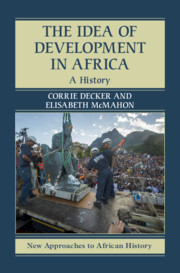Book contents
- The Idea of Development in Africa
- New Approaches to African History
- The Idea of Development in Africa
- Copyright page
- Contents
- Figures
- Tables
- Maps
- Boxes
- Acknowledgments
- Maps
- Introduction
- Part I Origins of the Development Episteme
- Part II Implementation of the Development Episteme
- Part III “Problems” in the Development Episteme
- Chapter 9 Reshaping Huts and Homes
- Chapter 10 Lessons in Separate Development
- Chapter 11 Capitalizing on Dis-ease
- Chapter 12 Manufacturing Modernization
- Epilogue
- Bibliography
- Index
- References
Chapter 9 - Reshaping Huts and Homes
from Part III - “Problems” in the Development Episteme
Published online by Cambridge University Press: 16 October 2020
- The Idea of Development in Africa
- New Approaches to African History
- The Idea of Development in Africa
- Copyright page
- Contents
- Figures
- Tables
- Maps
- Boxes
- Acknowledgments
- Maps
- Introduction
- Part I Origins of the Development Episteme
- Part II Implementation of the Development Episteme
- Part III “Problems” in the Development Episteme
- Chapter 9 Reshaping Huts and Homes
- Chapter 10 Lessons in Separate Development
- Chapter 11 Capitalizing on Dis-ease
- Chapter 12 Manufacturing Modernization
- Epilogue
- Bibliography
- Index
- References
Summary
This chapter takes up the first of the four development “problems” highlighted in Part III. Whether in the name of civilization, modernity, or modernization, interventions to transform the composite materials, structural designs, and locations of African homes represented the development agenda to reform African domesticity and labor. Discourses on improvement masked the political and economic agendas at work and ignored the indigenous logic of African residential construction and organization. From the nineteenth century development efforts urged Africans to build square or rectangular houses in place of round huts. The scientific work of early twentieth-century urban planners set the stage for what “modern” urban spaces would look like in African cities. In the postcolonial era urbanization has far outpaced the ability of states and private enterprise to provide affordable, modern housing for citizens. Urban Africans have begun to fight back against the assumptions made about informal settlements by development specialists and city planners from the global north. These activists are challenging their governments to see urban residential areas as social spaces that belong to all citizens, not just wealthy ones. In their challenge, informal settlement dwellers are forcing the international development community to Africanize the development episteme.
Keywords
- Type
- Chapter
- Information
- The Idea of Development in AfricaA History, pp. 187 - 208Publisher: Cambridge University PressPrint publication year: 2020

